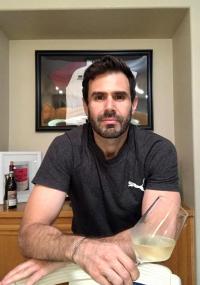Board Highlight: Federico Casassa
Get to know your ASEV directors!
 “What is cutting edge, what is going to become cutting
edge and what is going to become a milestone in the years to come
will probably get published or be presented through ASEV.”
“What is cutting edge, what is going to become cutting
edge and what is going to become a milestone in the years to come
will probably get published or be presented through ASEV.”
Born and raised in Mendoza, Argentina, Federico Casassa moved to the United States to pursue his doctorate degree at Washington State University under Dr. Jim Harbertson. Currently an associate professor of enology and wine sensory analysis at California Polytechnic State University, San Luis Obispo, Federico embodies a global perspective and is enthusiastic about all things wine. In addition to teaching, he conducts research on the viticultural aspects relevant to the Central Coast as well as the effect of winemaking techniques on phenolic extraction and retention in red wines. He makes wine for his friends and is responsible for developing Cal Poly’s branded wines and for the special cuvees produced for Cal Poly’s Dean of the College of Agriculture. In his free time, he does outreach to local industry, mostly in California, participates in wine judging and consults for sensory-related topics.
“ASEV’s reputation precedes them outside of the U.S. I learned about ASEV through the American Journal of Enology and Viticulture (AJEV) as a student in Mendoza. ASEV is an outstanding platform for networking and keeping abreast of issues and trends in the wine industry, not just from a purely academic standpoint but beyond. I was excited to join the ASEV board. I get to be exposed to diverse perspectives of an incredible and respected group of people, comprised of winemakers and viticulturists working in the wine and grape industry, as well as colleagues in key areas, such as community colleges. Expectedly, each institution has its own realities and issues, and sees the industry, education and outreach through slightly different lenses. This diversity is extremely valuable to me because it brings a complementary perspective to a variety of issues that the ASEV board handles. It also helps me as a professor to be able to share these perspectives with my students. ASEV connects the dots in all aspects of my work and professional relationships.”
When asked why Federico feels so strongly about ASEV, he responded: “We are living in times in which the signal to noise ratio is way too low. The wine industry is not impervious to that general trend. In the three main areas: viticulture, enology, and wine business, marketing and distribution, there is an overload of information that creates noise and make it difficult for industry actors to access valid and useful information. In viticulture and enology, ASEV has a tradition of providing state of the art, cutting-edge research in these areas with research inputs from every major wine region in the world, some of which have become milestones and have effectively advanced the wine and grape industry, even though ASEV has not received the recognition it deserves. People have taken for granted how much valuable information has been provided to California, the United States and beyond, thanks to the research that has been published or presented through ASEV. I cannot think of any time in the history of mankind where we have been able to make so much good wine. And why do you think that is? It is because of research.”
ASEV, its publications (AJEV and Catalyst) and the national conference, which he endearingly compares to taking in information similar to “drinking from a firehose,” provide access to vital information for the wine industry, including sommeliers, suppliers, and vendors who need actual, verifiable, and solid data.
The variety and validity of information, the reputation of the ASEV board members (and staff), the history of the ASEV and what has now become increasingly more important to cut through the noise – the access to outstanding information in a variety of formats, including presentations, technical talks, seminars, organized symposiums and in-written papers in AJEV and Catalyst – makes ASEV membership one the most important tools of success in the wine industry.
For Federico, ASEV has allowed him to meet prospective students, do research collaborations or research partnerships, connect with resources for materials such as winegrapes or additives, brainstorm about potential grants, meet vendors, and grow his network.
“ASEV to me is very practical and tangible, and I encourage everyone to look into a membership. I can’t emphasize enough that important things are happening in our industry right now. Joining ASEV and becoming involved will allow you to experience them right now.”
Prior to joining the ASEV board in 2020, Federico received several ASEV recognitions, including a scholarship (2013), Best Student Presentation Award (2012), and the AJEV Best Paper Award in two opportunities (2014 and 2017). He has an Aussie shepherd named “Bartolo,” in honor of Bartolo Mascarello, his favorite Barolo producer, and collect wines as a hobby. He’s particularly obsessed with vintage ports, having collected bottles from 1962, 1978, 1982, 1983, 1986 and 2003, to name a few. In his spare time he likes to play guitar or engaging in long workouts and running sessions.








